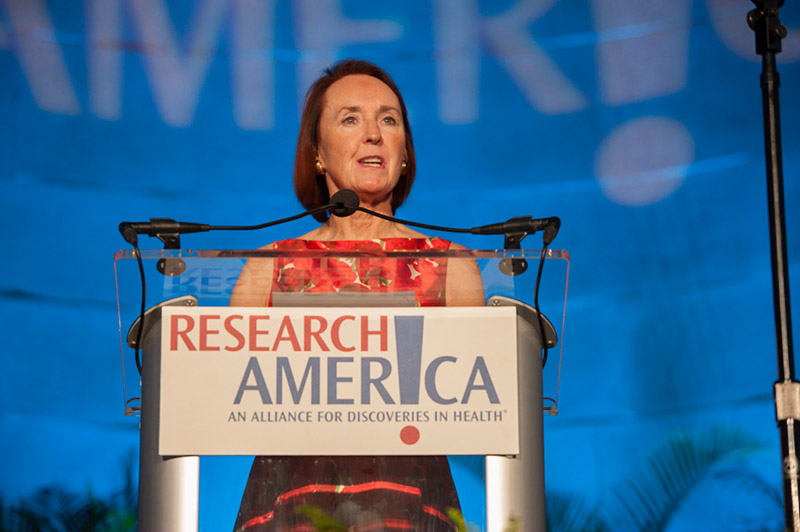Opportunities and Imperatives

 Dear Research Advocate,
Dear Research Advocate,
I am very pleased to announce that Research!America’s 2020 Advocacy Awards nominations are now open! Act now to nominate those you want to recognize for outstanding advocacy leadership on behalf of scientific, medical, or public health research. The awards will be presented at our dinner next March.
When members of Congress return to Washington, D.C. next week, the House will begin considering Fiscal Year (FY) 2020 appropriations bills, with the Labor-HHS Subcommittee scheduled to mark up their bill on April 30. Trust for America’s Health (TFAH) has released a new report explaining why our nation needs a well-resourced public health system (which pivots on a well-resourced Centers for Disease Control and Prevention (CDC)), to tackle some of our nation’s most challenging issues. The report provides terrific stats for use in advocating for robust CDC funding in the Labor-HHS bill. Our ask is for at least $7.8 billion in FY20.
The House Appropriations Committee has “deemed” $664 billion for defense and $631 billion for nondefense discretionary spending as they draft their FY20 spending legislation. Those numbers are significantly above the spending caps written into law and have not been finalized; Congress must take action to raise the spending limits in order to avoid deep, across-the-board cuts. Use our action center to weigh in now.
Here’s another important and time-sensitive opportunity to weigh in: Friends of Cancer Research (FOCR) is circulating a sign on letter asking the Trump Administration to reconsider action that would require another layer of review before the Food and Drug Administration (FDA) is permitted to issue guidances. These guidances include those bearing on critical public health issues such as drug and device safety and effectiveness, food safety, and the use of tobacco and tobacco-delivery devices like e-cigarettes.
It can take years (literally) for important FDA guidances to see the light of day as it is, not to mention that complying with the Administration’s new requirements would increase the workload of an agency that is already dangerously overburdened. (See this chart we developed in partnership with the Aspen Institute that looks at the increased number of rules and guidances FDA has been required to issue over the years, as well as this one tracing the long and winding road FDA regulations travel before seeing the light of day; the situation is similar for guidances).
Requesting that the Administration reconsider the new requirements makes sense for patients and for public health. If your organization would like to sign on, you need to act quickly: The deadline for signatures is tomorrow! Contact Ryan Hohman at [email protected] to add your organization’s name.
Yesterday, during our April alliance member meeting, we heard about two topics that also bear significantly on patients and public health. Lizbet Boroughs of the Association of American Universities (AAU) provided a valuable update on the increasingly complex topic of foreign funding of U.S. academic research. (AAU’s Science and Security Resource document is a great resource on this topic).
We also heard from Liz Fowler with Johnson & Johnson and former Chief Health Council on the Senate Finance Committee, who discussed prescription drug pricing. Her remarks helped underscore the challenge: affordability and fast-paced medical progress are dual imperatives, but they are not always treated that way. Medical innovations must be affordable to deliver on their promise, and affordability proposals that undermine medical innovation leave patients without options. Every stakeholder who cares about research and innovation – and affordable access to the products of it – should be engaged in finding a responsible path forward.
More research and innovation is desperately needed to address lupus, a chronic, inflammatory, autoimmune disease affecting more than 1.5 million people in the U.S. Lupus Awareness Month begins next week. I encourage you to use our new fact sheet as you talk about the solutions research can and does deliver.
Sincerely,
Mary Woolley




